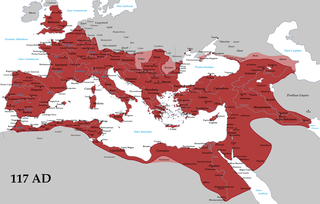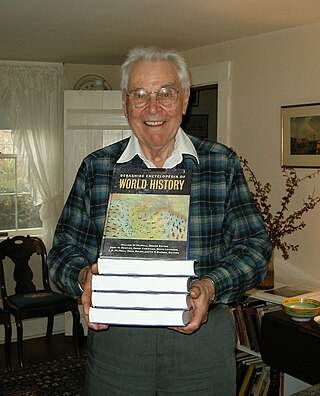
A civilization is any complex society characterized by the development of a state, social stratification, urbanization, and symbolic systems of communication beyond natural spoken language.

An empire is a "political unit" made up of several territories and peoples, "usually created by conquest, and divided between a dominant center and subordinate peripheries". The center of the empire exercises political control over the peripheries. Within an empire, there is non-equivalence between different populations who have different sets of rights and are governed differently. Narrowly defined, an empire is a sovereign state whose head of state is an emperor; but not all states with aggregate territory under the rule of supreme authorities are called empires or ruled by an emperor; nor have all self-described empires been accepted as such by contemporaries and historians.

Oswald Arnold Gottfried Spengler was a German historian and philosopher of history whose interests included mathematics, science, and art, as well as their relation to his organic theory of history. He is best known for his two-volume work, The Decline of the West, published in 1918 and 1922, covering human history. Spengler's model of history postulates that human cultures and civilizations are akin to biological entities, each with a limited, predictable, and deterministic lifespan.
World history or global history as a field of historical study examines history from a global perspective. It emerged centuries ago; leading practitioners have included Voltaire (1694–1778), Hegel (1770–1831), Karl Marx (1818–1883), Oswald Spengler (1880–1936), and Arnold J. Toynbee (1889–1975). The field became much more active in the late 20th century. It is not to be confused with comparative history, which, like world history, deals with the history of multiple cultures and nations, but does not do so on a global scale. World history looks for common patterns that emerge across all cultures. World historians use a thematic approach, with two major focal points: integration and difference.

Arnold Joseph Toynbee was an English historian, a philosopher of history, an author of numerous books and a research professor of international history at the London School of Economics and King's College London. From 1918 to 1950, Toynbee was considered a leading specialist on international affairs; from 1924 to 1954 he was the Director of Studies at Chatham House, in which position he also produced 34 volumes of the Survey of International Affairs, a "bible" for international specialists in Britain.

Guns, Germs, and Steel: The Fates of Human Societies is a 1997 transdisciplinary non-fiction book by Jared Diamond. In 1998, it won the Pulitzer Prize for general nonfiction and the Aventis Prize for Best Science Book. A documentary based on the book, and produced by the National Geographic Society, was broadcast on PBS in July 2005.

A Study of History is a 12-volume universal history by the British historian Arnold J. Toynbee, published from 1934 to 1961. It received enormous popular attention but according to historian Richard J. Evans, "enjoyed only a brief vogue before disappearing into the obscurity in which it has languished." Toynbee's goal was to trace the development and decay of 19 or 21 world civilizations in the historical record, applying his model to each of these civilizations, detailing the stages through which they all pass: genesis, growth, time of troubles, universal state, and disintegration.

The Decline of the West, is a two-volume work by Oswald Spengler. The first volume, subtitled Form and Actuality, was published in the summer of 1918. The second volume, subtitled Perspectives of World History, was published in 1922. The definitive edition of both volumes was published in 1923.

Human history, also called world history, is the narrative of humanity's past. It is understood and studied through anthropology, archaeology, genetics, and linguistics. Since the invention of writing, human history has been studied through primary and secondary source documents.
The ecumene or oecumene is an ancient Greek term for the known, the inhabited, or the habitable world. In Greek antiquity, it referred to the portions of the world known to Hellenic geographers, subdivided into three continents. Under the Roman Empire, it came to refer to civilization itself, as well as the secular and religious imperial administration. In present usage, it is most often used in the context of "ecumenical" and describes the Christian Church as a unified whole, or the unified modern world civilization. It is also used in cartography to describe a type of world map used in late antiquity and the Middle Ages.

Cultural pessimism arises with the conviction that the culture of a nation, a civilization, or humanity itself is in a process of irreversible decline. It is a variety of pessimism formulated by a cultural critic.

The history of Eurasia is the collective history of a continental area with several distinct peripheral coastal regions: the Middle East, South Asia, East Asia, Southeast Asia, and Western Europe, linked by the interior mass of the Eurasian steppe of Central Asia and Eastern Europe. Perhaps beginning with the Steppe Route trade, the early Silk Road, the Eurasian view of history seeks establishing genetic, cultural, and linguistic links between Eurasian cultures of antiquity. Much interest in this area lies with the presumed origin of the speakers of the Proto-Indo-European language and chariot warfare in Central Eurasia.

Peter Chardon Brooks Adams was an American attorney, historian, political scientist and a critic of capitalism.
A universal history is a work aiming at the presentation of a history of all of mankind as a whole, coherent unit. A universal chronicle or world chronicle typically traces history from the beginning of written information about the past up to the present. Therefore, any work classed as such purportedly attempts to embrace the events of all times and nations in so far as scientific treatment of them is possible.
Arthur L. Herman is an American popular historian. He currently serves as a senior fellow at Hudson Institute.
Comparative history is the comparison of different societies which existed during the same time period or shared similar cultural conditions.
Macrohistory seeks out large, long-term trends in world history in search of ultimate patterns by a comparison of proximate details. It favors a comparative or world-historical perspective to determine the roots of changes as well as the developmental paths of society or a historical process.

William Hardy McNeill was an American historian and author, noted for his argument that contact and exchange among civilizations is what drives human history forward, first postulated in The Rise of the West (1963). He was the Robert A. Millikan Distinguished Service Professor Emeritus of History at the University of Chicago, where he taught from 1947 until his retirement in 1987.
The Toronto School is a school of thought in communication theory and literary criticism, the principles of which were developed chiefly by scholars at the University of Toronto. It is characterized by exploration of Ancient Greek literature and the theoretical view that communication systems create psychological and social states. The school originated from the works of Eric A. Havelock and Harold Innis in the 1930s, and grew to prominence with the contributions of Edmund Snow Carpenter, Northrop Frye and Marshall McLuhan.
Eastern Party is a concept that has long been used by mainstream historians to define the reaction of a section of the population in the Third World countries against Westernization and the import of Western values in their societies. Rather than a specific political party, the term refers to a current in the public opinion of the said countries opposed to a "Western Party" of modernizers, who tend to accept Westernization as an inevitable phenomenon, which finally benefits the overall progress of Third World societies. Particularly in the history of Greece and Byzantium, this concept has been largely used by noted historians like Arnold J. Toynbee, Leften Stavrianos, Alexander Vasiliev and Nicolae Iorga, at the beginning of the 20th century and later by Dimitri Kitsikis.












